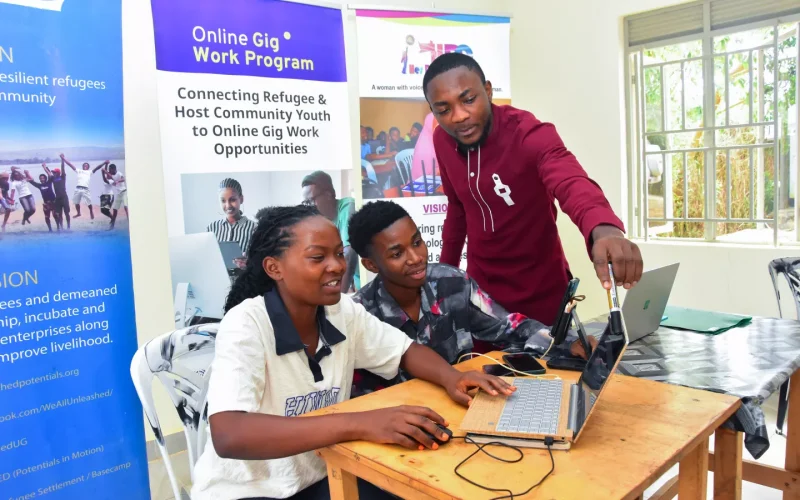By Mark Kawalya
The International Labour Organization (ILO) has introduced a new initiative aimed at helping young Ugandans become self-sufficient. The Online Gig Work Program equips Ugandans with crucial digital skills and connects them with job opportunities.
Uganda is the largest refugee hosting country in Africa. The country grapples with significant youth unemployment and a shortage of traditional job prospects. According to a recent ILO assessment, freelance and gig work in the online space offer a promising alternative due to their low barriers to entry and flexible nature. These are suited to vulnerable groups, such as refugees, who often face exclusion from conventional labor markets.
However, the initiative has some challenges. As Evans Lwanga, Chief Technical Advisor for ILO PROSPECTS Uganda, points out, “To fully tap into the potential of digital work, we must first address issues such as poor internet connectivity, lack of access to devices, limited training opportunities, and a gap in soft skills.” He further emphasizes that fair wages, along with labor and social protections for gig workers, are essential for long-term sustainability. To tackle these issues, the ILO has partnered with StartHub Africa and Kolaborate to enhance youth participation in income-generating digital work.
A lack of reliable digital infrastructure remains a significant barrier for many young Ugandans. In response, the ILO has established digital workspaces in Kampala and Nakivale Refugee Settlement. This is in collaboration with partners such as Unleashed, Her Dreams Count, and the Kampala City Council Authority. These hubs provide access to essential resources, including computers, stable internet, and electricity, creating an environment conducive to learning and professional growth. Furthermore, partnerships with organizations like UNICEF and UNHCR have helped supply digital devices for learning purposes.
Initially, the program aimed to train 200 participants in various skills such as web development, graphic design, content creation, and social media management. However, it drew almost 1,800 applicants from Kampala and Isingiro, with 600 meeting the selection criteria and 197 completing a 10-day intensive training.
According to Zulum Avila, ILO Specialist for Digital Employment Strategies, “Freelancing may seem accessible, but in reality, many jobs require years of experience and positive client feedback. This program is designed to help newcomers build the foundational skills necessary to succeed.”
Training sessions covered topics like personal branding, professional communication, client management, and the use of AI tools for increased productivity. To ensure the program’s longevity, a group of eight master trainers, some of whom are refugees, were prepared to continue training future participants. Additionally, sessions led by the National Organization of Trade Unions (NOTU) informed participants about their rights as online workers and offered practical guidance on overcoming challenges in the digital workspace.
Following the training, participants took on a test project, which helped trainers evaluate their job readiness. Those deemed ready are now being matched with freelance job opportunities through the Kolaborate platform.
For many, the program serves as a stepping stone to bigger prospects, enabling participants to sharpen their digital skills and earn income. Eddy Marumbi, a schoolteacher who enrolled in the program, used his newly acquired skills on real-world projects, which he then passed on to his students.
Throughout the pilot, several difficulties arose. Some participants dropped out due to transportation challenges or conflicting responsibilities. To address these issues, the ILO provided transport allowances, set up WhatsApp support groups, and offered more flexible schedules. Offline resources were also made available to those with unreliable internet access. Building on the lessons from this pilot, the ILO plans to extend the program to other refugee-hosting areas in Uganda, working toward a more inclusive digital economy for all.








